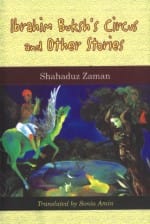On Shahaduz Zaman

Ibrahim Buksh's Circus and Other Stories by Shahaduz Zaman (translated by Sonia Amin), Dhaka: UPL; 2008.
Shahaduz Zaman is a Bengali writer, well regarded especially for his short stories. He has a doctorate in medical anthropology and teaches at BRAC University. He has written widely on the subject in both English and Bengali--I remember reading a Bengali daily's Eid issue where he published an engrossing ethnographic piece on our hospital culture. His dissertation and training has meant that a degree of native medical folklore and knowledge has seeped into his fiction, which has given them a texture and atmosphere unusual in Bengali short stories. In this collection of eight of his short stories in English translation being reviewed here, for instance, 'Clara Linden in Nijkolmohona' gives us examples of folk songs of midwives and those sung during pregnancy:
Tying knot upon knot,
Come, read the secret behind the veil
Add the name to the month of conception
Divide by eight--and the future foretell
If the remainder is one or three
Then a baby boy it is sure to be.
If the remainder be six, two, or four
A baby girl will be born for sure.
And if you should a zero behold
A miscarriage is foretold!
Not all of the stories, of course, are so distinctively marked by this specialized knowledge. 'The Story that Got Away' is about our 1971 liberation war, but with a twist, beginning with the writer pondering the hazards inherent in writing such a tale, and with the war narrative thus continually being broken up, interrupted, by authorial intrusions and turns and twists in the writer's imagination--an attempt to unveil the artistic process. Additionally, a surreal effect often results when a postmodernist narrative mode is applied to tales set not in urban areas or to slices of 'modern' Bangladesh life, but to stories unraveling deep within its rural heart. Shahaduz Zaman may not be to everybody's taste, but as Syed Shamsul Haq has observed, at the very least he is attempting to wrench the Bangla short story free from its "moribund" conventions.
It can also lead him into dubious areas. In the story 'Paper Plane,' a man on a bridge at night comes up to the narrator (unreliable, of course!) and says, " 'Listen, sir, Literature was not born the day a boy ran out screaming 'Wolf! Wolf!' with a huge brown creature in hot pursuit. It was born when that boy shouted 'Wolf! Wolf!' and there was no wolf at all!' " The above is actually Nabokov's famous formulation about literature and the necessary duplicity of the artist. While the erudite reader of English literary criticism may recognize and resonate to the words, one has to wonder: What about average readers reading the story in the original Bangla, who are very likely unaware of the deeper reaches of Nabokov's conception of art and the creative process? What are they to make of it? If unexplained (and I don't have the original Bangla with me), then it's in danger of being merely an acquired pose, an affectation of deep thought. Or perhaps in postmodernism it doesn't matter, in which case the issue is moot...
Sonia Amin, who teaches history at Dhaka University, has made a resolute effort at translating these stories. The sincerity of her effort can be gauged from the fact that she went to the nettlesome bother of actually rhyming the song lines (as well as other ones) quoted above, succeeding to a surprising extent. She started "the enterprise" slowly, beginning with publishing a few translations in this literature page, then steadily accumulating them towards this book. It contains several previously unpublished stories, including "a quiet gem of a piece, 'Ibrahim Buksh's Circus,' (which) reads like a novella." There are small lapses: different spelling of the same words ("fish monger" and "fishmonger," for example), or "knife wielding" not being hyphenated, or inappropriate capitalizations of words, but not enough to jar the reading.
One hopes that in the future she'll attempt translations of more Bengali works and authors.

 For all latest news, follow The Daily Star's Google News channel.
For all latest news, follow The Daily Star's Google News channel. 



Comments